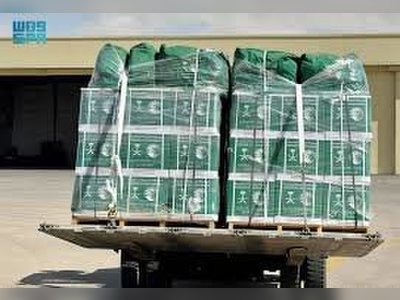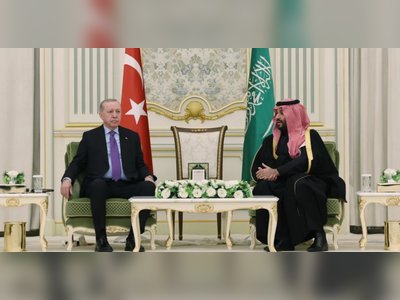
UN Prepares for Humanitarian Aid Surge in Gaza Amid Ceasefire Discussions
Efforts to expand relief operations face challenges as negotiators work towards finalizing a truce between Israel and Hamas, while border access remains uncertain.
UNITED NATIONS, United States: The United Nations is actively preparing to expand its humanitarian assistance to the Gaza Strip in the context of a potential ceasefire agreement between Israel and the Palestinian militant group Hamas.
However, logistical uncertainties and ongoing security challenges in the enclave are presenting significant obstacles.
Ongoing negotiations in Qatar are refining the final details of a ceasefire, with both mediators and the conflicting parties noting that a deal is closer than ever.
Central to the proposed truce is a substantial increase in humanitarian assistance to Gaza.
Sigrid Kaag, the UN's humanitarian and reconstruction coordinator for Gaza, has recently held discussions with Israeli and Palestinian ministers and engaged with the Egyptian foreign minister concerning the UN's role in a potential ceasefire, according to UN spokesperson Stephane Dujarric.
"The UN system as a whole is in intense planning and preparation for when a ceasefire comes into play, and how we can increase the aid," Dujarric stated.
Nevertheless, questions remain about which border crossings into Gaza will be operational under the ceasefire and how secure the enclave will be for distributing aid.
Past shipments have been compromised by armed gangs and looters amidst the conflict.
"Obviously, things that will continue to be challenging because we don’t have answers to all those questions," Dujarric emphasized.
The UN has consistently highlighted various obstacles to delivering aid in Gaza throughout the 15-month-old conflict.
It has accused both Israeli restrictions and internal unrest in the enclave of hindering aid entry and distribution within the war-torn region.
Global food security experts issued a dire warning in November, indicating a "strong likelihood that famine is imminent" in northern Gaza.
Palestinian health officials report that over 46,000 people have perished due to Israel's extensive military operations in the territory.
Israel maintains that the volume of aid supplied to Gaza, exceeding a million tons over the past year, has been adequate.
It accuses Hamas of diverting aid intended for needy Palestinians.
Hamas, in turn, denies these accusations and attributes shortages to Israel's policies.
Regarding the UN's Palestinian relief agency, UNRWA, its future operations remain uncertain, with a new law set to ban its activities on Israeli land and limit contact with Israeli authorities later this month.
Dujarric stated, "The UN and partner organizations are 'doing everything possible' to reach Palestinians in need with extremely limited resources.
"However, ongoing hostilities and violent armed looting as well as systematic access restrictions continue to severely constrain our efforts," he added.
"Road damage, unexploded ordinances, fuel shortages, and a lack of adequate telecommunications equipment are also hampering our work."
He stressed the necessity for "vital aid and commercial goods" to be allowed entry into Gaza through any available border crossings without delay and at a sufficient scale to meet humanitarian needs.
The backdrop to these events include the violent episode on October 7, 2023, when Hamas killed 1,200 people in southern Israel and abducted approximately 250 hostages, according to Israeli sources.
Since then, Israel has launched extensive military operations, severely impacting Gaza’s infrastructure, with humanitarian agencies reporting multiple displacements of the territory’s original 2.3 million residents.
However, logistical uncertainties and ongoing security challenges in the enclave are presenting significant obstacles.
Ongoing negotiations in Qatar are refining the final details of a ceasefire, with both mediators and the conflicting parties noting that a deal is closer than ever.
Central to the proposed truce is a substantial increase in humanitarian assistance to Gaza.
Sigrid Kaag, the UN's humanitarian and reconstruction coordinator for Gaza, has recently held discussions with Israeli and Palestinian ministers and engaged with the Egyptian foreign minister concerning the UN's role in a potential ceasefire, according to UN spokesperson Stephane Dujarric.
"The UN system as a whole is in intense planning and preparation for when a ceasefire comes into play, and how we can increase the aid," Dujarric stated.
Nevertheless, questions remain about which border crossings into Gaza will be operational under the ceasefire and how secure the enclave will be for distributing aid.
Past shipments have been compromised by armed gangs and looters amidst the conflict.
"Obviously, things that will continue to be challenging because we don’t have answers to all those questions," Dujarric emphasized.
The UN has consistently highlighted various obstacles to delivering aid in Gaza throughout the 15-month-old conflict.
It has accused both Israeli restrictions and internal unrest in the enclave of hindering aid entry and distribution within the war-torn region.
Global food security experts issued a dire warning in November, indicating a "strong likelihood that famine is imminent" in northern Gaza.
Palestinian health officials report that over 46,000 people have perished due to Israel's extensive military operations in the territory.
Israel maintains that the volume of aid supplied to Gaza, exceeding a million tons over the past year, has been adequate.
It accuses Hamas of diverting aid intended for needy Palestinians.
Hamas, in turn, denies these accusations and attributes shortages to Israel's policies.
Regarding the UN's Palestinian relief agency, UNRWA, its future operations remain uncertain, with a new law set to ban its activities on Israeli land and limit contact with Israeli authorities later this month.
Dujarric stated, "The UN and partner organizations are 'doing everything possible' to reach Palestinians in need with extremely limited resources.
"However, ongoing hostilities and violent armed looting as well as systematic access restrictions continue to severely constrain our efforts," he added.
"Road damage, unexploded ordinances, fuel shortages, and a lack of adequate telecommunications equipment are also hampering our work."
He stressed the necessity for "vital aid and commercial goods" to be allowed entry into Gaza through any available border crossings without delay and at a sufficient scale to meet humanitarian needs.
The backdrop to these events include the violent episode on October 7, 2023, when Hamas killed 1,200 people in southern Israel and abducted approximately 250 hostages, according to Israeli sources.
Since then, Israel has launched extensive military operations, severely impacting Gaza’s infrastructure, with humanitarian agencies reporting multiple displacements of the territory’s original 2.3 million residents.











